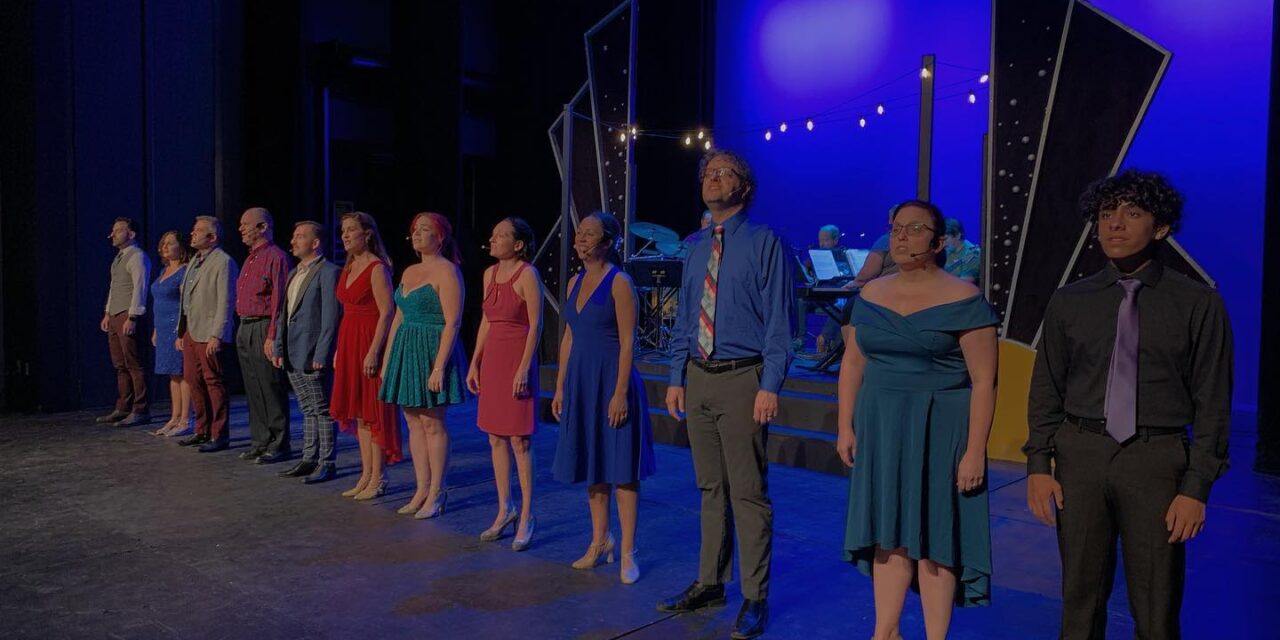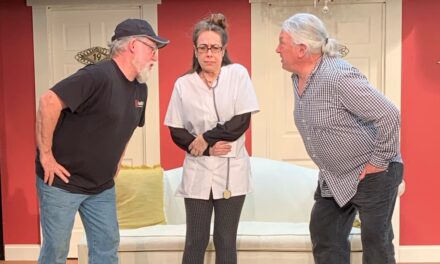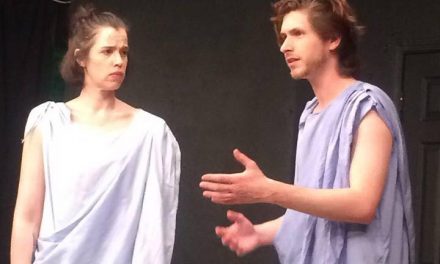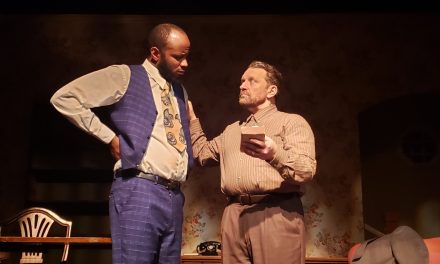CenterStage presents: A Century of Entertainment
By Patrick Vaughn, special to Arts-Louisville.com
Entire contents are copyright © 2022 Patrick Vaughn. All rights reserved.
There is no question that CenterStage, Louisville’s oldest community theatre and one of its most respected, deserved better treatment than it got from its new home at the Trager Family Jewish Community Center, but the company is making the most of the situation in its reopening show, a modest but satisfying trip down Memory Lane entitled A Century of Entertainment. The twelve-person cast, under the direction of CenterStage alum Jordan Price and new Director of Arts and Ideas Erin Jump, resourcefully delivers a quality evening of old favorite songs from old favorite shows from CenterStage’s first 100 years as interpreted by many of your old favorite CenterStage personalities, with some refreshing new talent thrown in for good measure.
In some ways, the new auditorium in which CenterStage will perform is an improvement upon its home at the former JCC, which is still undergoing demolition. The acoustics are better, the cast now has well-deserved dressing space, and the audience will appreciate cleaner restrooms and an improved flow of traffic through the lobby and parking lot, which is no longer laid out in that confusing series of one-way lanes.
In some ways, however, the new space fails to build on what came before. It’s still a pretty generic multi-purpose room of the kind you might find in any lower-middle-class public junior high school, which CenterStage must share with other programs. After an actual century, haven’t they proven by now that they deserve a dedicated space of their own? Audience seating is still makeshift, utilizing plastic stacking chairs positioned on risers. These are currently being borrowed from Bellarmine University while CenterStage awaits the delivery of its permanent risers this fall. For A Century of Entertainment, cabaret tables are available on the floor for an upcharge to a VIP ticket.
And yes, there are some ways in which the new space seems a steep downgrade from its predecessor. Ms. Jump obliged me with a private tour of the new playing space, and I was disheartened to find that there is no longer a permanent stage. For now, she has created a makeshift stage out of black platform flats, which works well for this show. There is also no tech booth; the sound and lighting consoles are set up behind the audience risers. Most frustrating of all, the new facility does nothing to solve the problem of CenterStage’s limited backstage space. While the auditorium is now seven feet deeper and the proscenium nine feet wider, the wing space has actually shrunk by four feet, there is very little room to cross behind the cyclorama from one side of the stage to the other and no fly space in which scenery can be hoisted upward for storage. How does the JCC expect CenterStage to move on to bigger and better shows when there is no place backstage for actors to cross over, let alone change and store scenery pieces?
As an audience member at A Century of Entertainment, of course, you will be blissfully unaware that the performers are dealing with any of these spatial challenges. The cast and band use the space so well that I am hesitant to reveal to you how hard they are working to create this illusion. But maybe that’s why CenterStage didn’t receive the consideration it deserved in the planning for the new facility. It’s hard for any audience member to appreciate what goes on behind the scenes, and ultimately that’s why someone like me must bring them to your attention.
I took my seat for Thursday evening’s premier already aware of these limitations imposed on the company by its new space, but by the time I exited the building, my reservations had softened somewhat, and I began to see the space’s potential. Heaven knows the entire Louisville theatre community is starting over again after a long intermission, and of course, we want our theatres to build back better. That means we must be prepared to accept that some things will shift. Let’s face it, CenterStage was beginning to suffer even before the pandemic. It had developed a reputation for churning out five or six massive musicals a year in rapid succession, and in the process of keeping up with that ambitious schedule and audience expectations, the quality of productions had begun to decline as more and more responsibility fell on the lonely shoulders of whoever was artistic director at the time, and who often doubled as producer, director, box office manager, costume designer, set designer, and even cast member for all five or six shows.
This model was unsustainable, of course, and the new management seems to have acknowledged it. Ms. Jump will direct only one other show this season (the late winter production of 13) and delegate the director’s chair to others for the remaining productions. The responsibilities of teaching and woodshedding the music and dance elements are likewise spread among multiple musical directors and choreographers. Perhaps we may hope that in its newest chapter, CenterStage will evolve and grow into something that no longer needs such luxuries as a traditional stage (I must admit the cast does feel less isolated from the audience without one) and that the concerns of many CenterStage alumni, including me, over the apparent trimming-down of the company’s ability to produce may yet prove beside the point.
For the sake of CenterStage’s legacy and future, and the hope that it will finally be given the upgrades it deserves, I encourage all members of the CenterStage community, whether you are an artist who has performed with the company onstage or a longtime fan, to give the new space a chance and make time for A Century of Entertainment, which pays loving homage to CenterStage’s past productions and makes time to preview some of the 2022-2023 season’s upcoming entries. Your cost of admission will be well spent, and you will be supporting a good cast with your presence. It may not be as slickly produced as, say, the Broadway or Bust reviews that CenterStage offered in the late 2000s, which were crammed from start to finish with medleys and mashups of songs from the gigantic musical extravaganzas on Broadway at that time. Price and Jump, actors themselves, have brought a more personal touch to this intimate cabaret, programming well-chosen songs that resonated both with CenterStage’s audiences over the years, as well as with the artists who performed them. They have selected familiar faces to welcome patrons back to CenterStage, and they seem to have directed them with an eye toward the individual personalities, specialties, and charms of each of the players, many of whom put their own singular spin on their songs.
The cabaret’s two acts roughly correspond to the themes of “Tradition” and “Vision.” Some of the songs presented in Act One are ones I remember seeing the first time, such as Lauren Goodman’s frantic “(Not) Getting Married Today” from Company and Jessica Adamson’s sexy “I Can’t Say No” from Oklahoma. Others, I wish I had seen the first time, such as Russell Cooper’s hilarious “You Won’t Succeed on Broadway” from Spamalot or Colette Mattingly and Landon Sholar’s gorgeous duet from The Bridges of Madison County. There is even one song, a holdover from the company’s tedious 2013 production of Les Miserables, that is frankly done better this time around.
I didn’t get the sense of vision I expected from the second act, which consists mostly of more songs from past CenterStage shows but with the genders of the singers swapped. A few of these might have benefited from transposition to a more performer-appropriate key, although Colette Mattingly and Emily Fields showed them all how it’s done with their haunting rendition of “Lily’s Eyes” from The Secret Garden, performed flawlessly in its original key. Other highlights include Adamson’s delightful take on “If You Were Gay” from Avenue Q, with a flustered Jennifer Poliskie proving an effective straight man, and newcomer Alex Hartz’s sensitive rendition of “Nothing” from A Chorus Line. Also, if you’ve ever wanted to see “You’ve Gotta Get a Gimmick” from Gypsy as performed by three dudes, then the wacky trio of Russell Cooper, Josh O’Brien, and Trent Byers has you covered. The finale is a notable exception to the program; I could be wrong, but I don’t remember CenterStage ever having produced Rock of Ages before.
The program does not attempt to break new ground or reinvent any wheels, and it doesn’t need to. This will be a rebuilding year for CenterStage, and A Century of Entertainment is all about reconnecting the cast and its audiences through shared favorite memories of CenterStage so far. This extends even to the cast’s program bios, in which they introduce themselves solely through their favorite CenterStage memory and do not list any other past appearances. Some of these recollections, like Adamson’s and Jennifer Poliskie’s, are quite funny. Others, such as Goodman’s, are surprisingly sweet.
The set list is, of course, far from comprehensive, and your favorite song from a CenterStage show might not have made the cut. I myself was surprised to hear nothing on the program from CenterStage’s oft-revived productions of Joseph and the Amazing Technicolor Dreamcoat, La Cage aux Folles, or The Full Monty. Alas, the history of CenterStage is too long and too rich to condense into one evening. Music director Kim Hartz has distilled the complex orchestrations of the shows into a workable reduction for a four-piece combo consisting of herself on keyboard, Benji Simmons on percussion, Doug Payne on guitar, and Dave Neill on bass. The four of them are onstage behind the cast for the entire cabaret, supporting the singers but remaining unobtrusive. I noticed only one moment during Thursday night’s performance when the band and the singers seemed not quite in sync with each other, but I’ll give them the benefit of the doubt and assume that snafu will be corrected by the time the production resumes performances Saturday night (it will take Friday night off for Shabbat, during which the Center is closed).
My only recommendation would be to tweak the sound design slightly: the body mics worn by the performers are very hot, and often they could hardly take a breath without loud hissing feedback from their receivers. Aside from this minor annoyance, I had a surprisingly good evening strolling down Memory Lane with some former colleagues from CenterStage’s past, and I wish them well in determining its future. A Century of Entertainment resumes performances Saturday night, continues through Sunday night, and concludes on Monday night.
Featuring Jessica Adamson, Trent Byers, Russell Cooper, Emily Fields, Lauren Goodman, Alex Hartz, Rusty Henle, Colette Mattingly, Josh O’Brien, Jennifer Poliskie, Landon Sholar, Kate Smith, and Erin Jump.
A Century of Entertainment
August 25, 27, 28, 29 @ 7:30 PM
CenterStage at Trager Family Jewish Community Center
3600 Dutchmans Lane
Louisville, KY 40206
CenterStage@JCC
Patrick Vaughn, special to artslouisville.com, is a reformed theater critic who became an actor and arts advocate as penance for his crimes against humanity. He is NOT better-looking in person.





